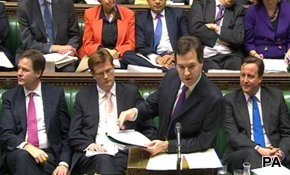The British public is ‘deeply pessimistic’ about the economy’s future in wake of Chancellor’s statement
Following George Osborne's autumn statement, the British people remain deeply pessimistic about the future of the economy. They are negative about the Government's handling of the economy and George Osborne's performance as Chancellor, but prefer Osborne to Ed Balls, and think Labour would be doing even worse.
- People think George Osborne is doing a bad job as Chancellor by 49% to 24% ‒ a sharp decline from when YouGov asked the same question after this year's budget when 34% thought he was doing a good job.
- Despite this, Osborne's lead over Ed Balls on who would make the better Chancellor has grown. 30% would now pick Osborne, with Balls on 24%, compared to a lead of 25% to 23% in July.
- 56% of people think the Government is handling the economy badly, with 34% thinking it is doing well.
- However, 37% of people think the economy would be even worse were Labour in power, with only 25% thinking that Labour would be doing a better job.
The Conservatives lead over Labour as the party best able to reduce the country's deficit, steer the economy through the crisis and support British business. However, Labour is seen as more able to create jobs, keep prices down and encourage growth.
Overall economic optimism remains extremely negative.
Only 2% of people think the economy is in a good state at the moment, compared to 81% of people who think it is in a bad state. Only 7% of people expect their financial situation to improve over the next 12 months, compared to 60% who expect things to get worse.
Asked what is most to blame for Britain's faltering growth, the Government is continuing to avoid the largest share of the blame, with only a minority blaming it for the current state of the economy. Asked to pick the two main factors for slow growth, the largest group of people blame the debt crisis in the Eurozone (44%), followed by the last Labour government (32%), the banks (31%) and 28% the current Government.
On the specific measures contained in the Autumn statement:
- The cancellation of the rise in fuel duty and lower increases in rail rates are the most popular measures, supported by 84% and 80% respectively.
- A majority of people back the increase in the bank levy (74%), spending on work placements for young people (68%) and spending on road and rail projects (64%).
- The 1% cap on pay rises for public sector workers is supported by 47%, with 41% of people opposed.
- A narrow majority (51%) opposes increasing the pension age to 67 by 2026, with 40% in support.
- The least popular measures are those increasing the right to buy discount to 50% (supported by 34%) and the £50 discount on water bills in the South West, which is supported in South, but receives predictably little support elsewhere.
- George Osborne's decision to update benefit payments in line with the 5.2% rate of inflation splits opinion down the middle - 40% of people think it was the right thing to do, 44% think it was wrong.
Despite extensions of enterprise zones and funding infrastructure projects in the North ‒ such as the electrification of the Transpennine express line, upgrading the Tyne and Wear Metro and reducing tolls on the Humber bridge ‒ the Chancellor’s statement was perceived as helping London more than other regions (26% saw the statement as helping London more than elsewhere), and helping the North the least of all (19% saw the statement as helping the North less than elsewhere).









